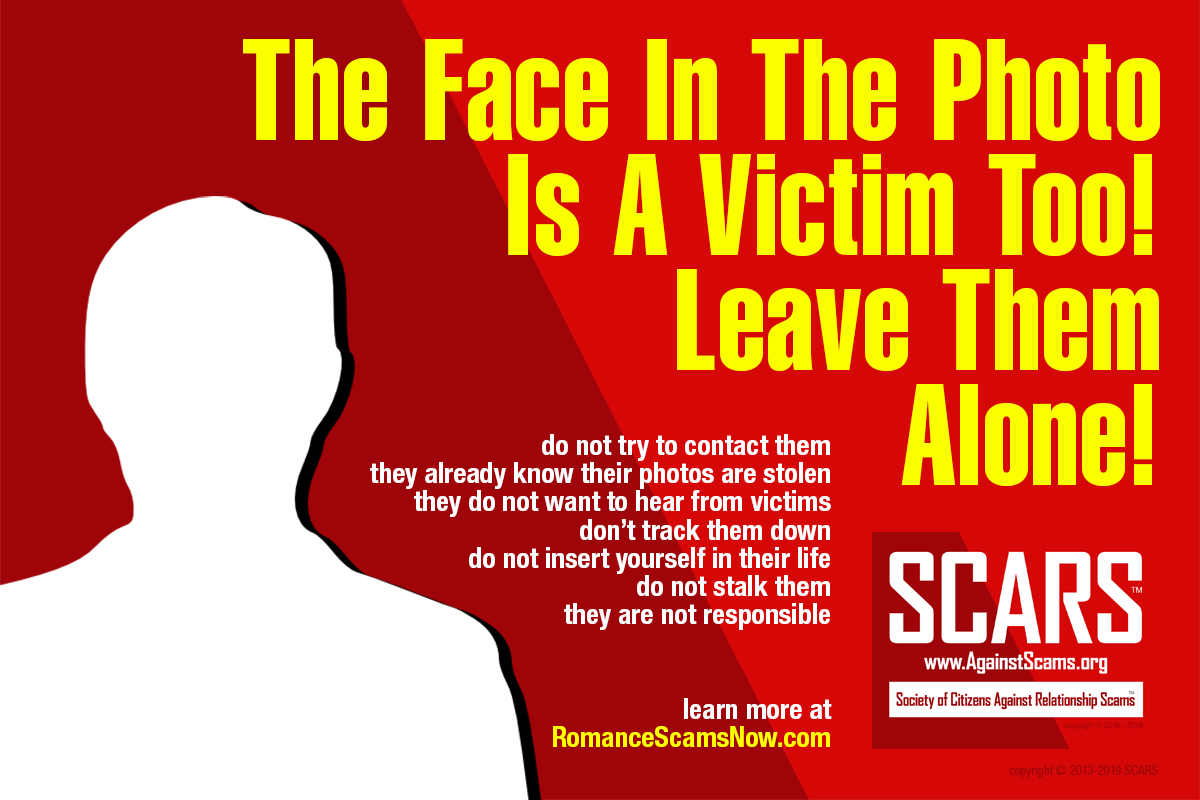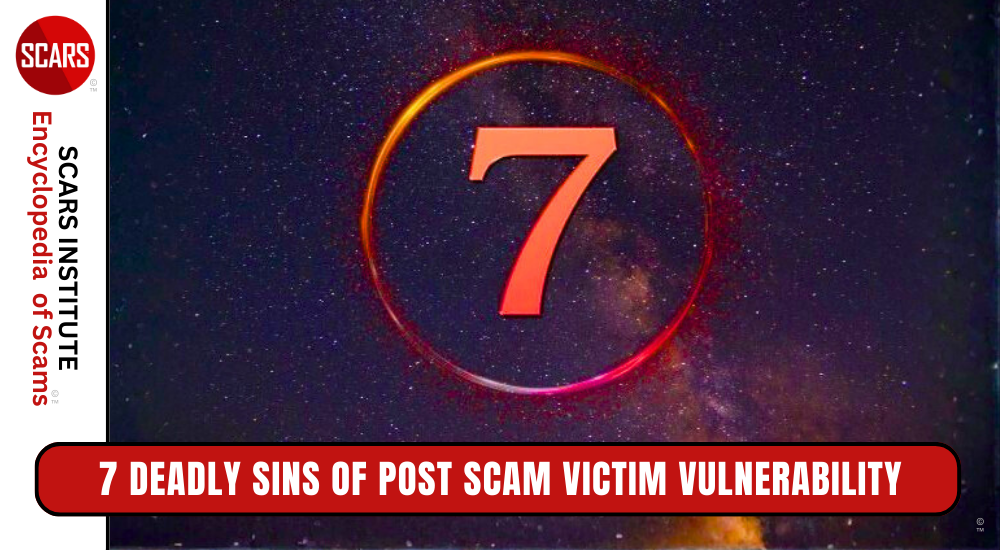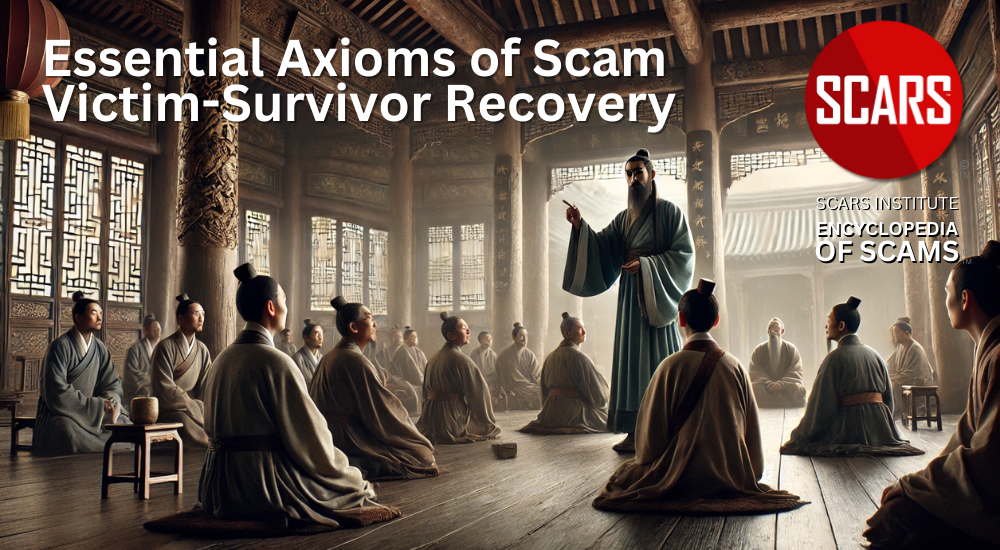
SCARS Institute’s Encyclopedia of Scams™ Published Continuously for 25 Years

SCARS™ Psychology of Scams: Why You Can’t Stop Looking At The Stolen Face
Why Some People Can’t Stop Thinking About Their Exes – Ex-Scammer’s Stolen Face
How are you dealing with a fake relationship breakup?
- Some people throw themselves into depression, some into anger, some try to work through it with work, or some through hunting down scammers and “exposing them”. These can all be efforts to distract themselves from the heartache and the trauma of the scam
- Others try to numb the pain with alcohol or drugs
- Still other victims jump right into a rebound scam relationship – most victims are scammed more than once
- Others seek out social support, spending time in social media groups and trying to connect with other victims
- Some seek out local counseling and therapy to help them recover
- Then there are those that track down and stalk the face in the photos used to scam them!
Breakup Studies
In a series of studies, Austrian psychologist Ursula Athenstaedt and her colleagues examined the use of recovery strategies in a sample of 876 young adults who’d recently experienced a breakup with a romantic partner. Their overall results indicate that the strategies people use to recover from a romantic breakup may depend on your gender (even if it was a scam relationship).
First, the researchers found that the men were much more likely than the women to think positively about their ex. In particular, the men still clung to the hope that they might get back with their former lovers. Meanwhile, the women tended to make a clean break from the relationship by focusing on the negative qualities of their exes and dismissing their positive aspects.
This translates into denial in the scam victim. Men carry far more denial about the scam then do women typically and have the hardest time accepting that they were scammed – somehow it must all be a big mistake.
Athenstaedt and colleagues maintained that this finding makes sense from an evolutionary perspective. That is, men maximize their reproductive fitness by engaging in multiple short-term relationships, whereas women do so by forming a long-term relationship with a man who will contribute to childrearing. From this perspective, men should hold on to the notion that their former girlfriend is still a potential partner, even while searching for alternatives on the mating market. In contrast, women should have little desire to return to a relationship that failed to meet their long-term needs.
Second, the researchers found gender differences in the types of coping mechanisms people use after a breakup. Specifically, the men were more likely to adopt “lose yourself” strategies, such as working long hours or engaging in extreme sports—or by numbing the pain through alcohol or drugs. Furthermore, men were more likely than women to jump into a rebound relationship, even when the long-term prospects were not good.
In contrast, women tended to seek out social and emotional support from friends and family. They also gave themselves time to heal before making themselves open to the possibility of a new relationship.
From a social network perspective, this finding makes perfect sense: Women usually have more friends and stronger emotional ties with them than men do. Also, women are accustomed to sharing their emotions and concerns with other women, both as talkers and as listeners.
Men, in contrast, tend to lead more solitary lives and to have more competitive relationships with other men. They’re also more dependent on their mate for social and emotional support. So when a relationship breaks up, they may lose the one person they felt comfortable opening up to.
According to David Ludden Ph.D.
Prior research has shown that men fare worse than women after a breakup. This finding holds not only for dating relationships, but also in cases of divorce or a partner’s death. The current study sheds light on the reason for this. Women make use of their extended social networks to garner the emotional support they need. In contrast, the most supportive link in men’s social networks is broken when they lose their mate, so they resort to “mind numbing” strategies that are ineffective in the long run.
For the most part, men and women do move on with their lives after a romantic breakup. But the interim period from the end of the previous relationship to securely settling in with the next can be difficult for many people. Once they’ve entered into a new relationship, both men and women report negative attitudes toward their ex—in other words, they’ve convinced themselves that what they have now is far better than what they had before. This certainly is a healthy frame of mind for nurturing a new relationship.
We See These Characteristics In Romance Scam Breakups As Well
It seems that thinking about an ex (in this case, the face that the victim fell in love with or was scammed with) is a sign that a victim still hasn’t gotten over the breakup of the scam relationship.
At the same time, ruminating over your romantic past could be keeping them from moving on and recovering from the scam trauma.
Instead, making a clean break with the scam and seeking out emotional support from a social support network are two important steps every victim should try to take to heal themselves after the end of a fake relationship. Yet few actually do this!
However, it takes more than just seeking out a support network, it is essential that the victims actually and actively participate to achieve any benefit from this.
The Face Fixation
A large number of romance scam victims will fixate on the face stolen by the scammers after the scam.
This fixation, which is really an obsession, will take many forms and lead to various unhealthy actions, including:
Stalking the impersonation victim in the photo
Victims will frequently track down or cyber-stalk the person who was impersonated by the romance scammer. Some victims believe that they have a duty to inform that person that they are being scammed, however in most cases this is a disguise for their deeper desire to confirm that the feelings that they have for this person are real – ignoring the fact that they have never had contact with them (just the scammer) and that they are invading the life of another victim.
These victims transfer the romantic relationship they had with the scammer that was using that face – to the real person pictured in the photos. This causes these victims to fail to realize that they are:
- Engaged in a crime such as cyberstalking, and in many cases real stalking since victims have been known to actually visit the impersonation victim in real life
- Many will contact the person to “inform” them directly – phone calls, emails, social media messages – about the scam and use of their photos. This frequently extends to the family members of the person as well – this results in significant disruption, and even harassment of the person and their families.
Some victims have been unable to understand that the face in the photo is not a scam but instead is actually a victim too!
This has resulted in calls to local police, news media, and social media postings accusing another victim of actually being the scammer. Such actions have been devastating for these impersonation victims, forcing them to file criminal charges against the original romance scam victims for their excessive actions. There are numerous cases pending against romance scam victims around the world for this.
They are just following the person!
Countless romance scam victims say they after the scam they have now tracked down the person pictured and they just follow them on social media!
But in reality, this is just another form of stalking – cyberstalking.
While this label tends to shock victims of romance scams that have been following the person they saw during the scam, the reality is this is neither healthy nor legal.
WHAT IS CYBERSTALKING?
Cyberstalking is stalking or harassment carried out over the internet.
It might target individuals, groups, or even organizations and can take different forms including slander, defamation and threats. Motives may be to control or intimidate the victim or to gather information for use in other crimes, like identity theft or offline stalking.
But it doesn’t have to be anything more than an invasive involvement in another person’s life.
The reality is any time a person is fixated on another person and “follows” their every online action it can be considered cyberstalking.
We should never blame victims of impersonation, but their victims frequently blame these impersonation victims for the scam.
Romance scam victims frequently judge the person whose images are stolen. They blame them for being “easy targets” and having their photos and information out there easy for scammers to steal.
Ironically, most romance scam victims themselves think nothing of publicly posting personal information, sharing their feelings and desires, publishing family photos and much more online.
Cyberstalking
Cyberstalking can take many different forms, but in the broadest sense, it is stalking (watching, observing, or following the life of another without their invitation) or harassment that takes place via online channels such as social media, forums or email. It is typically planned and sustained over a period of time.
Cases of cyberstalking can often begin as seemingly harmless interactions. Sometimes, especially at the beginning. However, if they become systematic, it becomes annoying and even frightening for the person being cyberstalked.
Romance scam victims cyberstalk for many reasons:
In most cases, it begins with curiosity about who the face really is. So scam victims will search out who that face belongs to.
However, being curious is one thing, and if it ended with just confirmation that there is a real person it would not be stalking. But more often than not, romance scam victims will attempt to contact this person or insert themselves into this person’s life – sometimes just a friend request, sometimes as a vigilante trying to defend the person, but in other cases forcing themselves on this person.
Just following a person online can be considered stalking.
Romance Scam Victims Frequently Believe They Have A Relationship
Many times the scam victims believe that because they had a relationship with that face that there must still be something – a connection – with the real person. This is simply a projection and is never true. The emotions that a romance scam victim feels about that face – that person – do not exist, they are projected by the scam victim, and is a clear sign that counseling or therapy should be considered to overcome this.
Cyberstalking Is Never Really Welcomed
However innocent it may appear, once a scam victim starts sending unwanted messages to an impersonation victim the line has been crossed.
Without any clear intention of desire, cyberstalkers can traumatize impersonation victims by sending messages, friend requests, comments, and just lurking in the background for whatever they do. It is especially unnerving when such messages come from different accounts managed by the same person as frequently happens when a victim is ignored.
Such actions can and in most cases will be reported to law enforcement agencies.
Remember, no matter what the scam victim believes, the impersonation victim has no relationship with them. Regardless of the intent to warn them – they have already had hundreds or thousands of warnings from other victims who have injected themselves into the person’s life and family.
Indirect Cyberstalking
Cyberstalking doesn’t have to involve direct communications and some cyberstalking victims may not even realize they are being stalked online.
Many times scam victims will “monitor” these people through various methods such as “following” on Facebook or following on other social media.
The line is really all about invitation – on LinkedIn for example, business people invite connections, but are still able to decide who can see and connect with them. However, on Facebook, most people do not even understand their privacy settings and have not invited followers since many do not even know that is possible.
Legal Aspects Of Cyberstalking
In the US, cyberstalking falls under harassment and anti-stalking laws and many countries around the world have similar laws. These laws allow for fines or even imprisonment.
Most cyberstalking legislation in the United States is done at the state level. The first U.S. cyberstalking law went into effect in California in 1999. Since then, there have been a huge number of legal cases related to cyberstalking.
One recent scam victim cyberstalking case is working its way through the courts in Germany, where a scam victim has been systematically harassing and interfering in the life of a former U.S. Army General – the scam victim befriends friends and family, has filed charges through local police, and made the retired general’s life miserable for years. But this is a more extreme case.
Most scam victims would be shocked to learn that they are engaged in criminal behavior just following the people pictured in the stolen photos used in their scams, but that is often the case.
Leave Them Alone
No victim has the right to inject themselves into the life of a stranger – after all, that is exactly what was done to them with traumatic consequences. The people whose photos were stolen, and whose identities were taken are victims too and deserve their privacy and dignity, just as scam victims do.
More importantly, following (stalking) another person is not helpful or healthful for a scam victim. Every scam victim needs to recognize the truth of the scam – that includes that there is no relationship with the person in the photo. By clinging to some trace of the scam relationship it holds scam victims back from their recovery.
As Hard As It May Be, Leaving Them Alone Is The Right Thing To Do!
This is why we recommend local counseling for any scam victim that is having difficulties controlling these impulses. Being able to recognize their own trauma and how it is manifesting is critical in being able to recover – counseling or therapy is a pathway to help victims do that, and as a check and balance on possible behavioral issues in the process!
TAGS: SCARS, Act AgainstScams, Information About Scams, Anti-Scam, Scams, Scammers, Fraudsters, Cybercrime, Crybercriminals, Romance Scams, Scam Victims, Impersonation Victims, Cyberstalking, Following Other Victims
SCARS™ Editorial Team
Society of Citizens Against Relationship Scams Inc.
A Worldwide Crime Victims Assistance Nonprofit Organization
Visit: www.AgainstScams.org
Contact Us: Contact@AgainstScams.org
PLEASE SHARE OUR ARTICLES WITH YOUR FRIENDS & FAMILY
HELP OTHERS STAY SAFE ONLINE – YOUR KNOWLEDGE CAN MAKE THE DIFFERENCE!
The Latest SCARS Posts:
FIND MORE SCAM NEWS
«SCAMCRIME.COM»
JOIN US ON FACEBOOK
«CLICK HERE»
END
MORE INFORMATION
– – –
Tell us about your experiences with Romance Scammers in our
« Scams Discussion Forum on Facebook »
– – –
FAQ: How Do You Properly Report Scammers?
It is essential that law enforcement knows about scams & scammers, even though there is nothing (in most cases) that they can do.
Always report scams involving money lost or where you received money to:
- Local Police – ask them to take an “informational” police report – say you need it for your insurance
- U.S. State Police (if you live in the U.S.) – they will take the matter more seriously and provide you with more help than local police
- Your National Police or FBI « www.IC3.gov »
- The SCARS|CDN™ Cybercriminal Data Network – Worldwide Reporting Network on « www.Anyscam.com »
This helps your government understand the problem, and allows law enforcement to add scammers on watch lists worldwide.
– – –
To learn more about SCARS visit « www.AgainstScams.org »
Please be sure to report all scammers
on « www.Anyscam.com »
Disclaimer:
SCARS IS A DIGITAL PUBLISHER AND DOES NOT OFFER HEALTH OR MEDICAL ADVICE, LEGAL ADVICE, FINANCIAL ADVICE, OR SERVICES THAT SCARS IS NOT LICENSED OR REGISTERED TO PERFORM.
IF YOU’RE FACING A MEDICAL EMERGENCY, CALL YOUR LOCAL EMERGENCY SERVICES IMMEDIATELY, OR VISIT THE NEAREST EMERGENCY ROOM OR URGENT CARE CENTER. YOU SHOULD CONSULT YOUR HEALTHCARE PROVIDER BEFORE FOLLOWING ANY MEDICALLY RELATED INFORMATION PRESENTED ON OUR PAGES.
ALWAYS CONSULT A LICENSED ATTORNEY FOR ANY ADVICE REGARDING LEGAL MATTERS.
A LICENSED FINANCIAL OR TAX PROFESSIONAL SHOULD BE CONSULTED BEFORE ACTING ON ANY INFORMATION RELATING TO YOUR PERSONAL FINANCES OR TAX RELATED ISSUES AND INFORMATION.
This content and other material contained on the website, apps, newsletter, and products (“Content”), is general in nature and for informational purposes only and does not constitute medical, legal, or financial advice; the Content is not intended to be a substitute for licensed or regulated professional advice. Always consult your doctor or other qualified healthcare provider, lawyer, financial or tax professional with any questions you may have regarding the educational information contained herein. SCARS makes no guarantees about the efficacy of information described on or in SCARS’s Content. The information contained are subject to change and are not intended to cover all possible situations or effects. SCARS does not recommend or endorse any specific professional or care provider, product, service, or other information that may be mentioned in SCARS’s websites, apps, and Content unless explicitly identified as such.
The disclaimers herein are provided on this page for ease of reference. These disclaimers supplement and are a part of SCARS’s websites Terms of Use.
Legal Notices:
All original content is Copyright © 1991 – 2020 Society of Citizens Against Relationship Scams Inc. (D.B.A SCARS) All Rights Reserved Worldwide & Webwide. Third-party copyrights acknowledge.
SCARS, SCARS|INTERNATIONAL, SCARS, SCARS|SUPPORT, SCARS, RSN, Romance Scams Now, SCARS|WORLDWIDE, SCARS|GLOBAL, SCARS, Society of Citizens Against Relationship Scams, Society of Citizens Against Romance Scams, SCARS|ANYSCAM, Project Anyscam, Anyscam, SCARS|GOFCH, GOFCH, SCARS|CHINA, SCARS|CDN, SCARS|UK, SCARS|LATINOAMERICA, SCARS|MEMBER, SCARS|VOLUNTEER, SCARS Cybercriminal Data Network, Cobalt Alert, Scam Victims Support Group, are all trademarks of Society of Citizens Against Relationship Scams Inc.
Contact the law firm for the Society of Citizens Against Relationship Scams Incorporated by email at legal@AgainstScams.org
-/ 30 /-
What do you think about this?
Please share your thoughts in a comment below!
Table of Contents
LEAVE A COMMENT?
Recent Comments
On Other Articles
- Arwyn Lautenschlager on Love Bombing And How Romance Scam Victims Are Forced To Feel: “I was love bombed to the point that I would do just about anything for the scammer(s). I was told…” Feb 11, 14:24
- on Dani Daniels (Kira Lee Orsag): Another Scammer’s Favorite: “You provide a valuable service! I wish more people knew about it!” Feb 10, 15:05
- on Danielle Delaunay/Danielle Genevieve – Stolen Identity/Stolen Photos – Impersonation Victim UPDATED 2024: “We highly recommend that you simply turn away form the scam and scammers, and focus on the development of a…” Feb 4, 19:47
- on The Art Of Deception: The Fundamental Principals Of Successful Deceptions – 2024: “I experienced many of the deceptive tactics that romance scammers use. I was told various stories of hardship and why…” Feb 4, 15:27
- on Danielle Delaunay/Danielle Genevieve – Stolen Identity/Stolen Photos – Impersonation Victim UPDATED 2024: “Yes, I’m in that exact situation also. “Danielle” has seriously scammed me for 3 years now. “She” (he) doesn’t know…” Feb 4, 14:58
- on An Essay on Justice and Money Recovery – 2026: “you are so right I accidentally clicked on online justice I signed an agreement for 12k upfront but cd only…” Feb 3, 08:16
- on The SCARS Institute Top 50 Celebrity Impersonation Scams – 2025: “Quora has had visits from scammers pretending to be Keanu Reeves and Paul McCartney in 2025 and 2026.” Jan 27, 17:45
- on Scam Victims Should Limit Their Exposure To Scam News & Scammer Photos: “I used to look at scammers photos all the time; however, I don’t feel the need to do it anymore.…” Jan 26, 23:19
- on After A Scam, No One Can Tell You How You Will React: “This article was very informative, my scams happened 5 years ago; however, l do remember several of those emotions and/or…” Jan 23, 17:17
- on Situational Awareness and How Trauma Makes Scam Victims Less Safe – 2024: “I need to be more observant and I am practicing situational awareness. I’m saving this article to remind me of…” Jan 21, 22:55
ARTICLE META
Important Information for New Scam Victims
- Please visit www.ScamVictimsSupport.org – a SCARS Website for New Scam Victims & Sextortion Victims
- Enroll in FREE SCARS Scam Survivor’s School now at www.SCARSeducation.org
- Please visit www.ScamPsychology.org – to more fully understand the psychological concepts involved in scams and scam victim recovery
If you are looking for local trauma counselors please visit counseling.AgainstScams.org or join SCARS for our counseling/therapy benefit: membership.AgainstScams.org
If you need to speak with someone now, you can dial 988 or find phone numbers for crisis hotlines all around the world here: www.opencounseling.com/suicide-hotlines
A Note About Labeling!
We often use the term ‘scam victim’ in our articles, but this is a convenience to help those searching for information in search engines like Google. It is just a convenience and has no deeper meaning. If you have come through such an experience, YOU are a Survivor! It was not your fault. You are not alone! Axios!
A Question of Trust
At the SCARS Institute, we invite you to do your own research on the topics we speak about and publish, Our team investigates the subject being discussed, especially when it comes to understanding the scam victims-survivors experience. You can do Google searches but in many cases, you will have to wade through scientific papers and studies. However, remember that biases and perspectives matter and influence the outcome. Regardless, we encourage you to explore these topics as thoroughly as you can for your own awareness.
Statement About Victim Blaming
SCARS Institute articles examine different aspects of the scam victim experience, as well as those who may have been secondary victims. This work focuses on understanding victimization through the science of victimology, including common psychological and behavioral responses. The purpose is to help victims and survivors understand why these crimes occurred, reduce shame and self-blame, strengthen recovery programs and victim opportunities, and lower the risk of future victimization.
At times, these discussions may sound uncomfortable, overwhelming, or may be mistaken for blame. They are not. Scam victims are never blamed. Our goal is to explain the mechanisms of deception and the human responses that scammers exploit, and the processes that occur after the scam ends, so victims can better understand what happened to them and why it felt convincing at the time, and what the path looks like going forward.
Articles that address the psychology, neurology, physiology, and other characteristics of scams and the victim experience recognize that all people share cognitive and emotional traits that can be manipulated under the right conditions. These characteristics are not flaws. They are normal human functions that criminals deliberately exploit. Victims typically have little awareness of these mechanisms while a scam is unfolding and a very limited ability to control them. Awareness often comes only after the harm has occurred.
By explaining these processes, these articles help victims make sense of their experiences, understand common post-scam reactions, and identify ways to protect themselves moving forward. This knowledge supports recovery by replacing confusion and self-blame with clarity, context, and self-compassion.
Additional educational material on these topics is available at ScamPsychology.org – ScamsNOW.com and other SCARS Institute websites.
Psychology Disclaimer:
All articles about psychology and the human brain on this website are for information & education only
The information provided in this article is intended for educational and self-help purposes only and should not be construed as a substitute for professional therapy or counseling.
While any self-help techniques outlined herein may be beneficial for scam victims seeking to recover from their experience and move towards recovery, it is important to consult with a qualified mental health professional before initiating any course of action. Each individual’s experience and needs are unique, and what works for one person may not be suitable for another.
Additionally, any approach may not be appropriate for individuals with certain pre-existing mental health conditions or trauma histories. It is advisable to seek guidance from a licensed therapist or counselor who can provide personalized support, guidance, and treatment tailored to your specific needs.
If you are experiencing significant distress or emotional difficulties related to a scam or other traumatic event, please consult your doctor or mental health provider for appropriate care and support.
Also read our SCARS Institute Statement about Professional Care for Scam Victims – click here to go to our ScamsNOW.com website.
















![Financial Recovery - Avoid Money Triggers - Perspective on Money for Scam Victims - 2023 [UPDATED 2025] Financial Recovery Money Triggers Financial Recovery - Avoid Money Triggers - Perspective on Money for Scam Victims - 2023 [UPDAYED 2025] - on the SCARS Institute RomanceScamsNOW.com - the Encyclopedia of Scams™](https://romancescamsnow.com/wp-content/uploads/2025/06/Financial-Recovery-Money-Triggers.png)
![Why People Blame Scam Victims? Stop Scam Victim Blaming - [UPDATED 2025] Why People Blame Scam Victims 2025 Why People Blame Scam Victims? Stop Scam Victim Blaming - [UPDATED 2025] - on the SCARS Institute RomanceScamsNOW.com - the Encyclopedia of Scams™](https://romancescamsnow.com/wp-content/uploads/2021/11/Why-People-Blame-Scam-Victims-2025.png)





Thank you for your comment. You may receive an email to follow up. We never share your data with marketers.